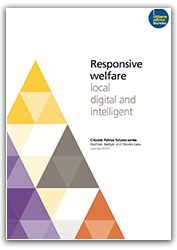Responsive welfare

There are many debates and many opinions about the right approach to welfare reform. But at Citizens Advice we see more of the successes, failures and human impacts of the welfare system than any other organisation in any sector. In this report we reflect on what we’ve learned and on the lessons this holds for how support should be delivered in the future.
Our advisers have seen numerous policy designs, claims processes and aspects of customer service refined and improved over the years. But they also see too many people sent from pillar to post, struggling to navigate their way through remote bureaucracies; struggling to make sense of the system and the decisions it generates; and struggling to move themselves forward to live independently as a result.
What we see tells us that the welfare system isn’t always working as well as it should, at huge cost to the public finances, public support and to the fabric of society. Many public servants working in it are frustrated, parts of the press and broadcast media routinely showcase its injustices and anomalies, and political parties appear to be intent on freezing and cutting entitlements faster and deeper.
Financial support is costly, but it is essential, like health or social care; it is far too important to both our economy and our society to continue to be kicked around and derided as an outdated and broken machine.
One school of thought is that unfair media representation is at the root of declining public support for the welfare system. Our view, conversely, is that welfare is less popular than in the past because the system isn’t working.
We therefore set out to determine what changes are needed, and this report proposes avenues to consider which are rooted in our experience as a service as well as our assessment of wider trends in society and the economy.
We hope that our ideas will chime with civil service and local leaders looking to rebuild trust in government through greater transparency, devolving power to the lowest practical level, improving service design and harnessing the power of new technology. We hope that they will chime with politicians looking for practical ideas on localism and for transformative ways to improve social outcomes. And we hope that they will chime with the public, who want to see integrated public services based on local understanding and expertise.

